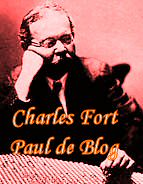Monday, July 05, 2004
SOME CLEAR THINKING
This was posted up by Blogger Mac Tonnies on his site for Saturday, July 03, 2004. It is very good and I have taken the whole text for yoy to read. However have a look at his Blog, always interesting.
""I've long been interested in "Occam's Razor" -- the scientific maxim that maintains that all things being equal, the simplest solution tends to be the correct one. But who gets the honor of defining "simple"?
It's a lot like Carl Sagan's "Extraordinary claims require extraordinary evidence." What, exactly, is "extraordinary"? "Extraordinary" to whom? Are the criteria subject to change?
Paranormal researcher Albert Budden nailed the problem when he pointed out that it's not science's goal to determine the "simplest" explanation; science should properly strive for the correct explanation.
All of which sort of leads the way to my new theory about UFOs and where they come from. I've been dissatisfied with the Extraterrestrial Hypothesis since encountering Jacques Vallee. But sometimes musing about a nonhuman "psychosocial control system" just seems too abstract, too vague and obtuse. Vallee himself pointed out that the prevailing materialist interpretation for UFOs is quintessentially American; Americans like to "kick the tires."
But could the phenomenon be both a physical, nuts-and-bolts reality as well as metaphysical? Arthur C. Clarke's "Any sufficiently advanced technology would appear indistinguishable from magic" certainly applies. But even Clarke was postulating arbitrarily advanced forms of known technologies; judging from his fiction, I doubt he invested much hope in "impossibilities" like telepathy and nonlocal consciousness -- both of which, I suspect, are slowly but certainly encroaching on the scientific arena.
One of the most interesting books I've read recently was Michael Cremo's exhaustively researched "Human Devolution." Cremo argues that the Vedic concept of the human soul is validated by various phenomena, including documented episodes of "psychic" activity and unexpected archaeological findings. Cremo's book is disappointing because he fails to synthesize his research into a coherent paradigm; it's fascinating reading, but his conclusion is little more than a thinly disguised rationalization for his personal religious beliefs.
I think the evidence demands a bolder revision of our role as sentient beings. By redefining human consciousness -- a process that 21st century neuropharmacology will almost certainly hasten, probably assisted by cybernetics -- it's possible to envision an Earth so utterly unlike conventional models that it may as well be alien.
My own thesis is both absurd and simple: We're sharing the planet with a home-grown intelligence that took a critically different evolutionary route in our own prehistory, exploiting consciousness itself as a technology while the recognizable "we" contented ourselves with the immediate, tangible world of physical matter. These others -- call them "aliens," simply for lack of a better word -- can access our own level of perception if they choose, but they don't inhabit a "parallel universe" of the type considered by theoretical physicists such as Michio Kaku. Our own universe is probably big enough for a far-flung ecology of nonhuman beings; we're just limited to an incredibly small portion of it, for reasons both biological and "spiritual." (John Keel's electromagnetic "superspectrum" is an especially useful metaphor, if nothing else.)
Maybe the reason we don't hear the incessant chatter of extraterrestrial radio transmissions or see megascale engineering works etched onto the dome of the night sky isn't because alien intelligences have uploaded themselves into addictive virtual environments; perhaps they've shed their physical forms, but in an altogether different fashion. They might inhabit a previously undetected cosmological substrate, enmeshed in the universe's deep structure as we twitch feebly on the surface, so many bacteria in an intergalactic Petri dish.
The familiar boundaries of space and time would be radically different to a being existing within this hidden order (what physicist/philosopher David Bohm termed the "implicate"). Interactions with lowly forms of intelligence like ourselves might be maddeningly cryptic; perhaps our only clues would take the form of Fortean anomalies: dark waves lapping silently against the shores of consciousness and batted furiously away if by some chance actually noticed.
This sort of cosmos is upsetting to Western science because it implies that consciousness is pliant and mutable, not necessarily dependent on a physical substrate. The implications are disturbingly theological: What purpose do we serve in this vast, secret world -- if any? Hindu texts, which describe a spectrum of conscious forms, forcibly suggest that humans are akin to larvae. If so, what are we to make of the myriad "humanoid" and UFO "occupant" reports that invariably surface year after year?
Maybe we can safely dispense with notions of interstellar visitors and wormholes. Our apparent visitors may not be "visiting" at all; conceivably, we are the newcomers . . .
posted by Mac at 1:24 AM""
Thanks Mac!
|
This was posted up by Blogger Mac Tonnies on his site for Saturday, July 03, 2004. It is very good and I have taken the whole text for yoy to read. However have a look at his Blog, always interesting.
""I've long been interested in "Occam's Razor" -- the scientific maxim that maintains that all things being equal, the simplest solution tends to be the correct one. But who gets the honor of defining "simple"?
It's a lot like Carl Sagan's "Extraordinary claims require extraordinary evidence." What, exactly, is "extraordinary"? "Extraordinary" to whom? Are the criteria subject to change?
Paranormal researcher Albert Budden nailed the problem when he pointed out that it's not science's goal to determine the "simplest" explanation; science should properly strive for the correct explanation.
All of which sort of leads the way to my new theory about UFOs and where they come from. I've been dissatisfied with the Extraterrestrial Hypothesis since encountering Jacques Vallee. But sometimes musing about a nonhuman "psychosocial control system" just seems too abstract, too vague and obtuse. Vallee himself pointed out that the prevailing materialist interpretation for UFOs is quintessentially American; Americans like to "kick the tires."
But could the phenomenon be both a physical, nuts-and-bolts reality as well as metaphysical? Arthur C. Clarke's "Any sufficiently advanced technology would appear indistinguishable from magic" certainly applies. But even Clarke was postulating arbitrarily advanced forms of known technologies; judging from his fiction, I doubt he invested much hope in "impossibilities" like telepathy and nonlocal consciousness -- both of which, I suspect, are slowly but certainly encroaching on the scientific arena.
One of the most interesting books I've read recently was Michael Cremo's exhaustively researched "Human Devolution." Cremo argues that the Vedic concept of the human soul is validated by various phenomena, including documented episodes of "psychic" activity and unexpected archaeological findings. Cremo's book is disappointing because he fails to synthesize his research into a coherent paradigm; it's fascinating reading, but his conclusion is little more than a thinly disguised rationalization for his personal religious beliefs.
I think the evidence demands a bolder revision of our role as sentient beings. By redefining human consciousness -- a process that 21st century neuropharmacology will almost certainly hasten, probably assisted by cybernetics -- it's possible to envision an Earth so utterly unlike conventional models that it may as well be alien.
My own thesis is both absurd and simple: We're sharing the planet with a home-grown intelligence that took a critically different evolutionary route in our own prehistory, exploiting consciousness itself as a technology while the recognizable "we" contented ourselves with the immediate, tangible world of physical matter. These others -- call them "aliens," simply for lack of a better word -- can access our own level of perception if they choose, but they don't inhabit a "parallel universe" of the type considered by theoretical physicists such as Michio Kaku. Our own universe is probably big enough for a far-flung ecology of nonhuman beings; we're just limited to an incredibly small portion of it, for reasons both biological and "spiritual." (John Keel's electromagnetic "superspectrum" is an especially useful metaphor, if nothing else.)
Maybe the reason we don't hear the incessant chatter of extraterrestrial radio transmissions or see megascale engineering works etched onto the dome of the night sky isn't because alien intelligences have uploaded themselves into addictive virtual environments; perhaps they've shed their physical forms, but in an altogether different fashion. They might inhabit a previously undetected cosmological substrate, enmeshed in the universe's deep structure as we twitch feebly on the surface, so many bacteria in an intergalactic Petri dish.
The familiar boundaries of space and time would be radically different to a being existing within this hidden order (what physicist/philosopher David Bohm termed the "implicate"). Interactions with lowly forms of intelligence like ourselves might be maddeningly cryptic; perhaps our only clues would take the form of Fortean anomalies: dark waves lapping silently against the shores of consciousness and batted furiously away if by some chance actually noticed.
This sort of cosmos is upsetting to Western science because it implies that consciousness is pliant and mutable, not necessarily dependent on a physical substrate. The implications are disturbingly theological: What purpose do we serve in this vast, secret world -- if any? Hindu texts, which describe a spectrum of conscious forms, forcibly suggest that humans are akin to larvae. If so, what are we to make of the myriad "humanoid" and UFO "occupant" reports that invariably surface year after year?
Maybe we can safely dispense with notions of interstellar visitors and wormholes. Our apparent visitors may not be "visiting" at all; conceivably, we are the newcomers . . .
posted by Mac at 1:24 AM""
Thanks Mac!
|

